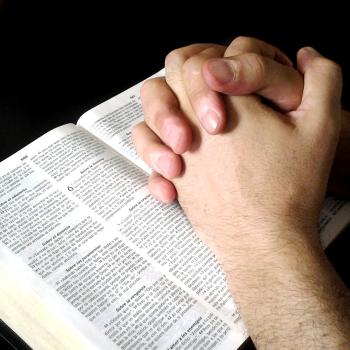Can a Christian love their country?
Short answer: Of course, but with a great big Jesus-centered “but…”

Image via Pixabay
Longer answer:
Every country calls its citizens to obedience and patriotism. From the youngest of ages, we are literally taught to love our country, to feel national pride, to celebrate our victories, and if we’re being honest, to gloss over our shortcomings.
As for me, I. Am. Canadian. (hey, remember this guy?).
And I am very, very grateful for my home country. I honestly would not wish to live anywhere else in the world. I am blessed beyond measure, and I thank and praise God for it.
In this sense, yes, of course, a Christian can love their country.
However –
The nations of this world are just that – “of this world.” Canada is of this world.
It is not a “Christian nation,” in that the vast majority of people are not worshipping or actively following Jesus, and the government as a whole is not consulting Christ or Scripture to govern its decisions.
Canada is not the Kingdom of God.
One day the nations will fully submit to Jesus (Rev 11.15), but that day has not yet come.
We must be honest that this country has a lot of skeletons in the closet. There is sin and evil in our past that have led us to where we are today. Cultural genocide, legal racism, slavery (not just an American problem!), violence, broken contracts, corrupt leaders, greed.
I don’t love these things about Canada at all.
Bring up these issues, and some Canadians get very angry and defensive. People don’t always take it well when they feel like you are challenging something that they love.
But our Christian commitment to truth and integrity calls us to honesty, even if painful. We don’t like it when other people make excuses or try to smooth over their sins, and so we shouldn’t hold our nation to a different standard.
Now, of course, I am a sinner, as is every reader. I have a few skeletons in my own closet, and I certainly would not wish to be judged entirely by my past.
So in all fairness, we should have some grace for past sins, acknowledging that we in the present didn’t commit them.
But this doesn’t mean that the former sins don’t need repentance and rectification and reconciliation in the present. The effects of sin can last for generations, and if there are steps we can take to bring blessing where there has been damage done, then Christ-followers should take them.
And I appreciate greatly that, although imperfectly, at times our nation does seek to do this in various ways.
So we can certainly love our country, as long as we don’t ignore or excuse its past sins, and as long as we seek to bring healing to the damage done by its sin.
On the other side, we certainly can also celebrate the wonderful things that Canada has done. Humanitarian work, democratic rights and freedoms, diplomatic peacemaking around the globe, medical breakthroughs, human rights advancements (not always our strong suit historically, but certainly stronger today!), foreign aid, social programs for the struggling, and oh my goodness, universal healthcare.
Call us socialists all you want. Health care is a basic human right. We take care of every Canadian who gets sick, no matter who they are. This sounds very Christ-like to me (Mt 25.34-40). God bless our system and the wonderful people who serve in it.
These things are praiseworthy! Gratitude-inspiring, to be certain.
I love all of these things about my country.
But we must also note that, of course, not all of our sin is in the past. There are many things that are perfectly legal in Canadian law that Scripture forbids. Both our laws and our culture celebrate things that surely grieve the heart of God.
And it’s easy to think about certain hot-button social issues that get a lot of attention, but there are also other matters relating to money, power, class, race, and politics that are contrary to Scripture and the way of Christ.
Do Christians love this about our country?
We shouldn’t.
But other than a few issues like abortion, most Christians are silent on such matters.
Then there is the sticky matter of patriotism.
Every State demands it. We are indoctrinated young. Our entire culture literally revolves around government and state matters.
Political discussions and debates and divisions dominate our news cycles, our social media feeds, our conversations, our thoughts and our plans.
I would suggest that politics and government demand an ungodly amount of our attention.
From what I am seeing, especially these days, many Christians share and post about politicians, political positions, government issues, and often their anger at those “on the other side,” significantly more than they share Jesus and His Gospel.
Social media feeds are full of opinions on earthly matters in earthly kingdoms with earthly leaders…all of which will pass away.
We cannot avoid the matters of earth, of course. Earth is where we live.
But Jesus and the early church lived under a tyrannical empire that sought to suppress the Gospel, limit religious freedom, jail and torture dissidents, and which ultimately killed Christ, most of the apostles, and a number of early church members.
Interestingly, they rarely talk about it (this has been explored in greater detail in a previous column).
I imagine life under Roman rule at that time was incredibly difficult for the faithful. There was undeniably persecution. There was loss of freedom. There was prison time. There was torture. There was violence. There was martyrdom.
And in the teachings of the New Testament, this political kingdom and its leaders just don’t come up very often.
Jesus and His apostles were too busy being consumed by a completely different Kingdom.
When Christ arrived on earth, He announced: “The Kingdom of Heaven has come near!” (Mt 4.17)
In Jesus, a new Kingdom has begun here on earth.
We are citizens of that Kingdom (Phil 3.20), first and foremost.
It is the top priority by infinity. Our earthly nation shouldn’t even come close.
We must be so, so careful to guard our hearts.
Cultural beliefs overwhelm us and suck us in, even when they are contrary to the way of Christ.
Patriotism easily becomes idolatry. It is designed that way. The powers and systems of this world demand allegiance, and we are taught to give it to them from pre-school on. To not give it is to invite anger and consequence.
But our allegiance is ultimately to Christ. Our adoration belongs to Him. Our attention belongs to Him. Our lives revolve around Him, and not our nation, not our leaders, not any political party or worldly ideology.
And certainly we are called to be witnesses of Christ everywhere (Ac 1.8), which can include the political system that we live under. Paul used the rights of his Roman citizenship to advance the cause of the Kingdom (Ac 22.22-29; 25.11-2), and we can use our rights for this purpose as well. There is a time and place for engagement. At times in history, Anabaptists have ignored this call.
But there is one King, and one Kingdom, and Canada and its leaders are not it.
I am worshipfully grateful for my country, but it should not receive the majority of my attention or my devotion.
If our conversations are dominated by talk of the country and its leaders, and less about the Kingdom and its King, then we need to re-prioritize.
If our free time reading, scrolling, and watching is consumed with earthly politics more than Kingdom matters, we need to adjust.
If our social media posts talk about secular government matters more than Jesus Christ, then we need to make some changes.
If we’re consumed with earthly issues and haven’t pointed to or led anyone to Christ recently, then we’re giving too much of our attention to the wrong thing.
The issue is not really about whether a Christian can love their country; of course they can. If God so loved the world, then it means that He loves our country, and gave Himself for it (Jn 3.16).
The issue is more about where our country sits in our hearts.
If we can love our land while acknowledging its sin without excuses or deflection, and work towards holiness and healing, then good.
If we can love our land without compromising our commitment to Christ and His Kingdom, then good.
If we can love our land without being corrupted by its values that are contrary to Scripture, then good.
If we can love our land without falling prey to the idolatrous side of patriotism, elevating our devotion to an ungodly level, then good.
If we can love our land without letting it and its politics become consuming, dominating our thoughts and conversations more that the Kingdom, then good.
If we can love our land by paying our taxes, praying for our rulers (even those we disagree with), and living peaceful lives in godly submission (unless doing so would cause us to disobey Christ), then good.
If we can love our land by praying for it regularly, seeking for God to build His kingdom here on earth, then good.
So we put our country in its proper place, well below the Kingdom in our hearts, our time, and our attention.
And we always, always seek first the King and Kingdom of Heaven, and His righteousness (Mt 6.33), and we let every other earthly matter pale in comparison to His Kingdom and its glory.
********
If you’re enjoying what you read, you can follow Third Way Christians on Facebook or Instagram, or sign up to get new columns emailed to you here! As well, you can track along with Chris’ church teaching at Meadow Brook Church’s YouTube page!
















